In a lifetime of sports, A.S. Roma’s historic Champions League win over Barcelona tops them all
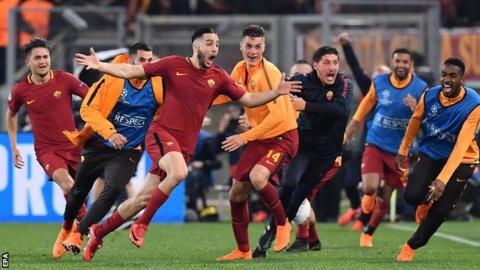
I never saw a sportswriter cry.
I spent 40 years in the business and I never saw one of my brethren break down from the sheer emotion of what he or she was witnessing. I sure as hell never did. If my story sang, if I made deadline, I could’ve covered the public execution of my alma mater’s coach and I’d be unmoved. Sportswriters are the vultures of journalism. We hover over the weak, and we pick at the dead. Our souls are ice. Sympathy, sorrow, do not run through our veins. Only cold blood. We only show emotion if we miss last call.
Yet Tuesday night, in a packed Olympic Stadium of 60,000 screaming souls lost in disbelief, joy and sheer, unadulterated passion, my area in the press tribune flooded with tears. Two journalists next to me embraced and wept on each other’s shoulders. Three more behind me took photos of the scoreboard, trying to keep tears from soaking their cell cameras. Press tables bounced from the pounding fists. It was as if this crusty collection of ink-stained wretches had experienced an epiphany, a vision. Here in Rome, the center of the Catholic world, we’re used to hearing of miracles.
But not like this.
A.S. Roma’s historic, mind-bending 3-0 win over Barcelona provided visual evidence of a miracle no one in the Vatican could make up. Behind by an autostrada after after last week’s self-destructing 4-1 loss in the first leg of the Champions League quarterfinal, Roma shut out the No. 1 team in the world, a team that had lost once in 45 games this season, and advanced (on away goals) to the Champions League semifinal for the first time.
I managed not to cry. I’ve been here only 5 ½ years. I’ve followed A.S. Roma for only 17. Yet I found myself, after 40 years in the business, taking sportswriting’s one given doctrine and shredding it, throwing it to the four winds.
I cheered in the press box.
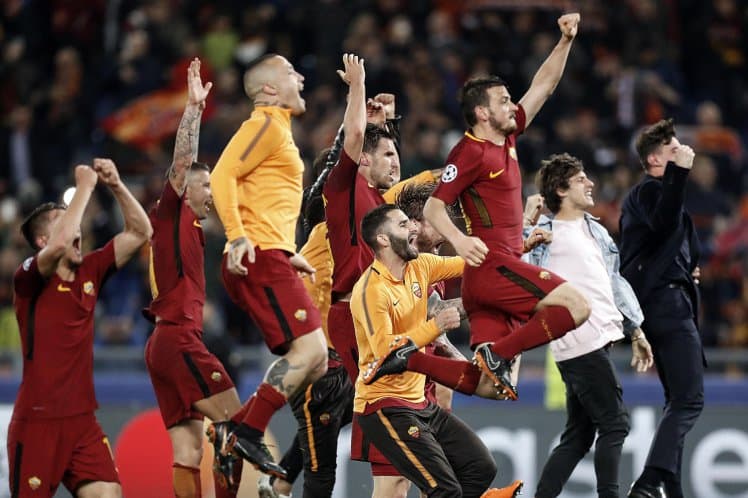
In the U.S., you don’t do that. It’s a one-way ticket out of your seat. Yet rules in Rome are different. My once distaste for Roman journalists cheering during games has turned into a quiet, understanding nod the more I dive into Rome’s culture. Tuesday I screamed. I cringed. I gasped. Hell, I cheered.
I’ve earned that right. One benefit of retiring to Rome is I could leave my journalism’s objectivity at the door and become a fan again. I follow Roma through the prism of that new-found fanatic. I go to watch parties in my favorite pub. I curse players, coaches. Half my wardrobe is red and yellow. I now understand the highs and lows my readers experienced all these years, how a silly game’s outcome could establish your mood for the next 24 hours. Maybe longer.
It’s why Tuesday’s game meant so much. I’ve covered six Olympics, eight Final Fours, three World Series, two Super Bowls, the 2006 soccer World Cup when Italy won it all, countless big games of teams I covered on a daily basis. Yet at 62 years old, Roma’s win was the greatest game I ever witnessed.
In any sport. And I wasn’t the only one.
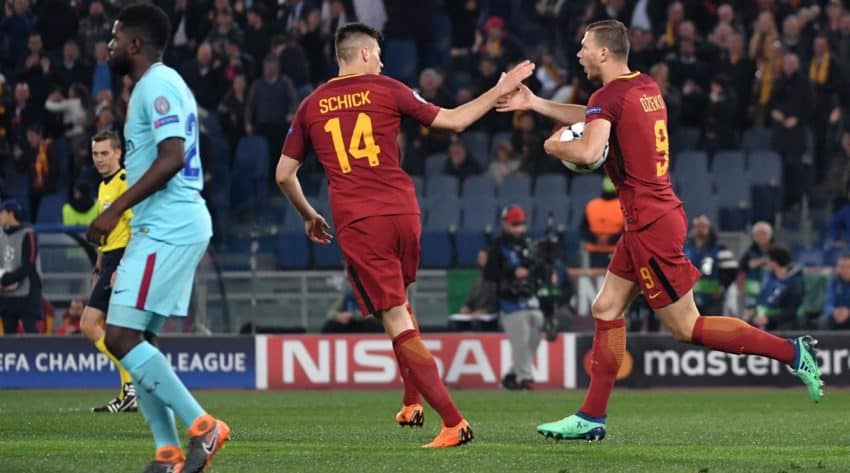
“You cannot imagine, I mean it was incredible, crazy. I don’t know how to describe it,” said Roma forward Edin Dzeko, by far the best player on a field that included soccer saint Lionel Messi and his deadly sidekick, Luis Suarez.
I started Tuesday wondering if I should blow off the inevitable outcome and instead go to Sunday’s bitter Lazio-Roma derby. I haven’t covered fights since I left Las Vegas. Instead, I sat down and mapped out the two difference between the A.S. Roma and F.C. Barcelona. How big is the chasm?
Bigger than the sea between the two cities.
To wit:
Revenues: Barcelona made $688 million last season. That’s the most behind only Manchester United. Roma earned $242 million.
Value: Barcelona is worth $4.5 billion behind only the Dallas Cowboys, New York Yankees and Manchester United. Roma is worth $569 million.
Payroll: Barcelona’s average player salary is $8.58 million, highest in the world; Roma’s is $3.38 million, fourth in Italy’s Serie A.
Stadium: Barcelona’s Camp Nou holds 99,354 and averaged 77,984 last season; Rome’s Olympic Stadium holds 60,000 for soccer and averaged 32,638.
Titles: Since 2008, Barcelona has won six domestic La Liga titles, five Copa del Rey domestic cup titles, five Spanish Super Cup titles, three Champions League titles, three UEFA Super Cup titles and three FIFA Club World Championship titles. Roma won the domestic Italian Cup in 2008. It has reached one European final: losing to Liverpool on penalties in the 1984 European Cup, the precursor to the Champions League which was renamed in 1992.
Youth academies: Since 2002, Barcelona’s has been considered the best in the world. The graduates have combined for 4,663 appearances and 773 goals for Barcelona. The AS Roma Youth Sector has won the Under-19 Primavera title eight times.

Star power: Messi has won five Ballon d’Or trophies as the best player in the world and four European Golden Shoe awards for Europe’s top scorer. In 412 games in 14 seasons he has 378 goals. He makes $667,000 a week, according to Forbes. That doesn’t include a $59.6 million bonus when he signed an extension in November or the $30 million annually from endorsements. Daniele De Rossi, Roma’s highest-paid player, makes $185,000 a week. In his 17th season, the midfielder has 42 goals in 437 games. He helped Italy win the 2006 World Cup.
2017-18: Before Tuesday Barcelona had 33 wins, 11 ties and one defeat. Its 24-7-0 mark put it first in La Liga, 11 points ahead of Atletico Madrid. Barca is in the Copa del Rey final. Roma was a combined 22-8-10. At 18-6-7, it precariously clings to fourth place in Serie A’s fourth and final qualifying spot for next season’s Champions League. It had just come off a 2-0 loss at home to Fiorentina.
On a perfect night in the 50s, I sat in my seat in the second row of the press tribune at almost midfield prepared to write about a gap Roma couldn’t possibly overcome. I sat next to one of my favorite soccer writers, a guy I’d been trying to reach for two days. Paddy Agnew has covered soccer in Italy since 1986. He’s Northern Irish. He’s no Roma fan. He follows rapidly ascending Burnley in England’s Premier League. I asked Agnew what hope teams like Roma have of becoming a European power with all the financial gaps between organizations.
“They have to attract more serious investment, and they have to be able to build a stadium,” Agnew said. “Then after that you’ve got to be lucky in how you spend your money when you have it.”
Olympic Stadium, the cavernous monument to the 1960 Olympics on the banks of the Tiber, is in need of replacement. But for one night, this old lady reached a fever pitch I never heard at Denver’s legendary decibel dungeon, Mile High Stadium.
While I’ve always been a glass-is-half-empty guy, those who see every glass half filled with fine Barolo wine saw in last week’s debacle some hope. Barcelona scored twice on Roma own goals when defensive slides by De Rossi and Kostas Manolas went into the net. Roma had the more aggressive attack. Messi wasn’t his usual dominant self. If you look close, Roma could play with these guys.
Roma manager Eusebio Di Francesco, a relative unknown until he took over this season, talked optimistically for two days. He called Barcelona “a machine” but told the media, “We must believe until the end and hope to make a miracle or something truly unthinkable.”
Di Francesco made changes. He switched from his usual 4-3-3 formation with four players on defense to a 3-4-3 to add bulk in the midfield and disrupt Barcelona’s legendary ball-keeping skills. Barcelona manager Ernesto Valverde made no changes.
What enveloped was what Corriere dello Sport called the next day, “The perfect game.” Roma was on the attack from the outset, putting Barcelona’s defense on its heels and keeping the ball away from Messi and Suarez. Manolas even stripped Messi on a breakaway. The fans got some hope — or maybe, at the time, just entertainment value — in the sixth minute when Dzeko miraculously managed to control a long, high-bouncing pass in the 18-meter box and bounce it past goalkeeper Marc-Andre ter Stegen.
Still, Barcelona hadn’t given up three goals since a 3-1 loss to Real Madrid in the Spanish Super Cup on Aug. 13, a span of 50 games. This was a long way from a miracle. No one at the Vatican was turning on his TVs yet.
But the crowd got into it. The Roman night exploded even on corner kicks. Barcelona defender Gerard Pique barely blocked Aleksander Kolarov’s great goal attempt from close range and Patrik Schick sent a wide-open header just over the bar. Ter Stegen made a great save on a Dzeko header.
Roma was dominating. Barcelona tried playing ball possession to the extreme, a conservative tactic for a team this talented. Messi was just another body. His lone chances were a couple of free kicks that went way high. The half ended with Roma up 1-0.
I didn’t feel hopeful. But I felt proud. That was enough.
Valverde made no changes in the second half. He did not put in more defense. Then something happened. Hope. Optimism. Belief. And one helluva lot of noise. The skies didn’t open, but a miracle was starting to creep over Olympic Stadium’s circular roof.
On another Roma attack, Pique yanked Dzeko down by the shirt for a penalty kick. In the only time all night the stadium was silent, De Rossi drilled a bullet into the right corner for a 2-0 lead. In the 58 years of the stadium’s life, including an Olympics and a Serie A-clinching win in 2001, maybe never has it been as loud as that moment.
Thirty-two minutes remained. Suddenly, a lot of TVs turned on in the Vatican.
Barcelona was getting nervous. Messi got a yellow card for roughing Kolarov. Suarez rolled around for three minutes as if hit by a sniper, the most active he’d been all night. Ter Stegen stalled on free kicks like he was waiting for a cab. But he was the best player on Barca’s night and he made great diving stops on Dzeko and substitute Stephan El Shaarawy.
Time clicked down. Eight minutes remained plus stoppage time. But reality, Roma’s habitual enemy, refused to step in. The noise level rose. Roma’s Cengiz Under lined up for a corner kick. That day I read that the average Serie A team scores on set pieces, such as corner kicks, once every 10 chances. Roma scores once every 74. They had a better chance knocking it in with a pool cue.
Under sent a line drive curving short of the near post. Manolas, the best player in Greece, sprinted in front of the entire Barcelona team. His head flicked it sideways just past ter Stegen inside the far post for arguably the biggest goal in club history. Manolas ran through the field, chased by hysterical teammates, with his eyes and mouth as wide as if he’d seen an asteroid destroy a large planet.
In a way, he had.
Screw Zeus. Kostas Manolas is the true Greek god.
The press box rocked with heaving bodies. In a nearly out-of-body experience, I noticed myself yelling, “OH, MY GOD! OH, MY GOD!! OH, MY GOD!” The shock as a sportswriter had caught up with my joy as a fan. I felt 50 percent raw joy and 50 percent journalistic disbelief. Could this be happening? Where’s the pope?
The din made the stadium sound like the inside of a jet engine. Agnew couldn’t hear my comments yelled a foot away from him. Then 60,000 gasped when a ball bounced through the 18-meter box into Messi’s path. However, he couldn’t control the high bounces and Allison Becker grabbed it with ease. Manolas blocked two more shots. A Barcelona corner kick went out of bounds. Becker stopped one last cross.
As his final goalie kick floated to earth and the buzzer sounded, he dropped to the ground. Kolarov sprinted to him and slid on his knees into his arms. A handsome Brazilian goalkeeper and a heavily tattooed Serbian embraced like long-lost lovers. I tried hugging the journalists next to me but they wouldn’t break from their clutch, their sobs audible as they rocked back and forth.
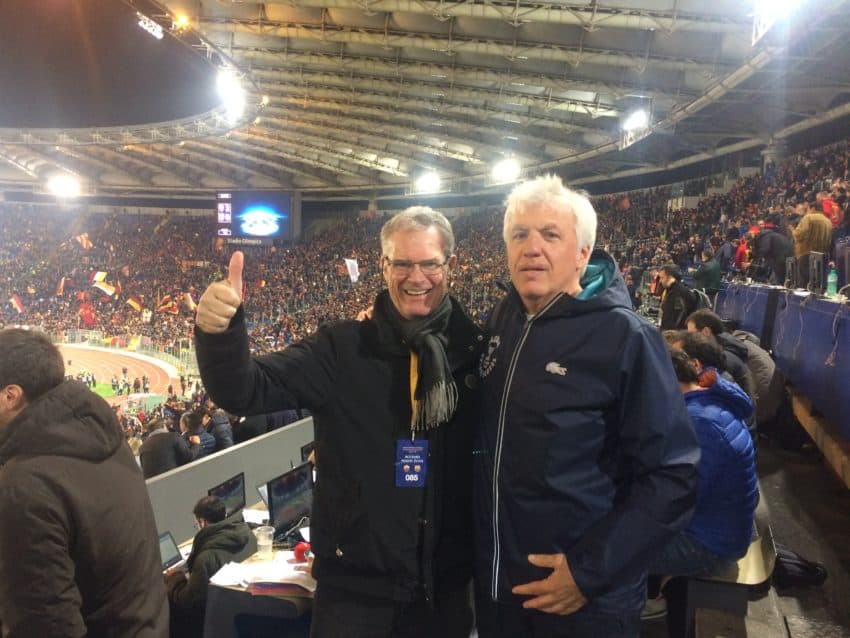
Agnew was the one stoic journalist left. I asked him if he’d ever seen anything like this.
“It’s two-leg football,” Agnew said calmly. “It’s 180 minutes. The 4-1 result from the first leg was a completely false result. Barcelona was not even the better team. Roma should’ve had a penalty and they scored the first two Barcelona goals for them. Roma happens to have a very good team. But if this is the best side in Spanish football then Spanish football is very overrated.”
I went into the mixed zone where Roma players in their traditional black suits hugged every official greeting them. Midfielder Alessandro Florenzi, who grew up in Rome’s Centro Storico, raced up the tunnel still hooting and hollering. Holding court was James Pallotta, the American owner who has spent every waking hour trying to build a $1.5 billion stadium in a city where building a lawn chair gets buried in red tape.
I asked him what the win says about the perceived gap between the two organizations.
“Over an intermediate or longer period of time there’s probably some gaps between the Bayerns and the Romas and the Barcelonas,” he said. “At the end of the day it’s a function of having three or four times more revenues than we do. They have a lot more flexibility. It gets tiring every day when people say we’re a super market.
“The Roma fans really — all of you — have to help us with the stadium. Because when we build that stadium — and it should get approved soon and if it doesn’t you really should go crazy — and we have that entertainment complex then our revenues go up as much or more than anybody else in Serie A. Then we start looking at revenues that put us, certainly in the (world’s) top 10 and maybe in the top five or six or seven teams. Then you can consistently play against everybody else.”
By the time I left the stadium, it was 12:10 a.m., 90 minutes after the final buzzer. A flag-waving mob refusing to leave surrounded Florenzi’s car yelling Roma songs. I stopped by a late-night snack stand across the street from the stadium and cars made a continual loop up and down the street honking horns.
The bus dropped me at Piazza del Risorgimento next to the Vatican. Horns rocked into the night. At 1:15 a.m. I arrived in my neighborhood, Testaccio, where A.S. Roma was signed into existence in a small building not far from my home in 1927. Youths in Francesco Totti jerseys walked by me waving flags. We exchanged clenched fists and “FORZA ROMA!”
Meanwhile, Pallotta was jumping in the fountain in Piazza del Popolo and the streets filled with impromptu parades and flags and songs and hugs. I called my girlfriend. Marina, a third-generation Roman, is a casual romanista. Even she watched the game and remained in shock. Later she wrote me, “La Roma e’ fatta cosi … fa schifo e e’ stupenda.. Come la citta!” (A.S. Roma does this. It sucks and is fabulous, like the city!)
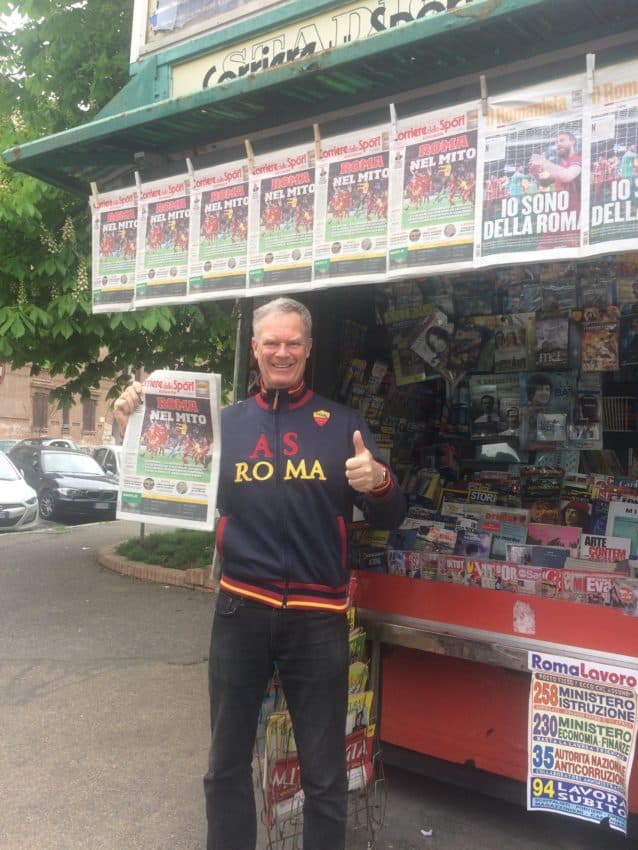
Five years ago, I would’ve reacted with a nightcap and a good book. This time I walked in my door at 1:45 a.m. and couldn’t even remove my clothes. What did I just experience? This wasn’t just an historical event that awoke the sports world. I just experienced a high, the ultimate fan’s high. It’s when your heart grows into your throat. You’re short of breath. You rub your eyes to see if it’s all real.
My connection with this wonderful team has become entwined with this beautiful city. After years of pounding keyboards and catching flights, of chronicling teams’ successes and failures with the disattached observance of a prison guard, at 62 my transformation to fandom is complete.
This vulture has turned into a dove.


April 11, 2018 @ 2:34 pm
Simply a great piece of writing, John.
April 12, 2018 @ 12:50 am
Thanks, Hal. That means more coming from you. When are you going to Germany?